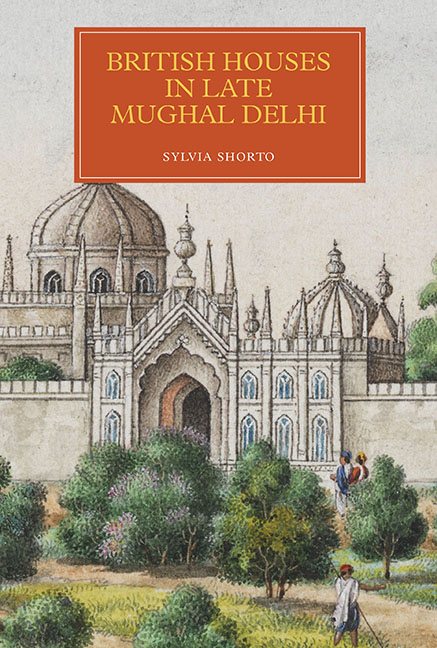Book contents
- Frontmatter
- Dedication
- Contents
- List of Illustrations
- Preface and Acknowledgements
- Abbreviations
- Glossary
- Map
- Chapter 1 Knowledge of Delhi: The Eighteenth Century
- Chapter 2 Hybrid Accommodations: David Ochterlony, the First Residency and the Mubarak Bagh
- Chapter 3 A Lovely Wilderness: Charles Metcalfe and the Garden Houses at Shalimar
- Chapter 4 Truly Fairy Palaces: Robert Smith in Delhi and in Europe
- Chapter 5 The World Displayed: William Fraser and his House on the Hill
- Chapter 6 A Tomb with View: Thomas Theophilus Metcalfe's Dilkusha
- Chapter 7 Dreaming of Home
- Bibliography
- Index
- Miscellaneous Endmatter
Chapter 7 - Dreaming of Home
Published online by Cambridge University Press: 07 July 2018
- Frontmatter
- Dedication
- Contents
- List of Illustrations
- Preface and Acknowledgements
- Abbreviations
- Glossary
- Map
- Chapter 1 Knowledge of Delhi: The Eighteenth Century
- Chapter 2 Hybrid Accommodations: David Ochterlony, the First Residency and the Mubarak Bagh
- Chapter 3 A Lovely Wilderness: Charles Metcalfe and the Garden Houses at Shalimar
- Chapter 4 Truly Fairy Palaces: Robert Smith in Delhi and in Europe
- Chapter 5 The World Displayed: William Fraser and his House on the Hill
- Chapter 6 A Tomb with View: Thomas Theophilus Metcalfe's Dilkusha
- Chapter 7 Dreaming of Home
- Bibliography
- Index
- Miscellaneous Endmatter
Summary
In Henry Yule's glossary of Anglo-India terms, Hobson-Jobson, there is a telling entry under the word home: ‘Home always means England. Nobody calls India home – not even those who have been here thirty years or more, and are never likely to return to Europe.’ Victor Jacquemont had made a similar observation: ‘People do not come here to live and enjoy life; they come – and this is the case in all states of society here – in order to gain something to enjoy life elsewhere.’ In this concluding chapter, I focus not on property speculation and house building in urban and suburban Delhi, or on ways of ruling through oblique methods of control, or on trying to get rich quickly or improve one's social standing, but rather on a deep-seated feeling that was present in the conscious minds of all my subjects: the desire to return to live in Britain. All five, at one time or another and regardless of their degree of Indian assimilation, harboured this desire, although only one of them would properly achieve it and then, apparently, without any real happiness. Through the records of their dreams of home, I now explore meaning in the establishment of a pedigree for the descendants of David Ochterlony; William Fraser's unfulfilled desire to build in Scotland; the family responsibilities of Charles Metcalfe; and the architecturally energetic but personally tragic later life of Robert Smith.
‘Who can wonder that he clings to the only country in the world where he can feel himself at home?’ mused Reginald Heber after one of his with encounters with David Ochterlony shortly before the latter died in the summer of 1825. Heber's accounts have played a major role in the construction of an orientalist narrative of Ochterlony's long life in India, with his oft-repeated descriptions of elephants, red tent encampments and other examples of ‘eastern habits’. These, however, deflect us from a deeper and more rounded understanding of the man who had, just a few years earlier, thought seriously about returning to live in Scotland and who in his will made arrangements for his grandson and only male heir, Charles Metcalfe Ochterlony (1817–91), to do just that, providing him with an income-producing estate on land with historic family associations.
- Type
- Chapter
- Information
- British Houses in Late Mughal Delhi , pp. 175 - 188Publisher: Boydell & BrewerPrint publication year: 2018

